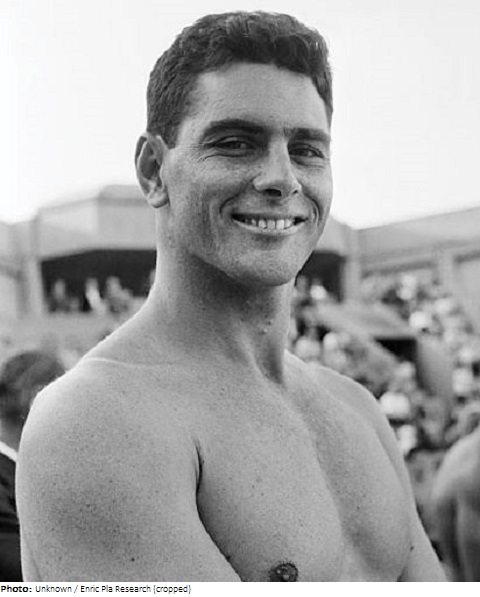
| Roles | Competed in Olympic Games |
|---|---|
| Sex | Male |
| Full name | John Thomas•Devitt |
| Used name | John•Devitt |
| Born | 4 February 1937 in Granville, New South Wales (AUS) |
| Died | 17 August 2023 (aged 86 years 6 months 13 days) in Sydney, New South Wales (AUS) |
| Measurements | 185 cm / 85 kg |
| Affiliations | ?, Queensland, (AUS) |
| NOC |  Australia Australia |
| Medals | OG |
| Gold | 2 |
| Silver | 1 |
| Bronze | 1 |
| Total | 4 |
John Devitt was a great swimmer whose career was somewhat tainted by all the controversy surrounding his 1960 Olympic 100 m freestyle victory. At Roma, the pre-Games favorite to 100 m freestyle gold was American Jeff Farrell, but he had an emergency appendectomy just six days before the US Olympic Trials and only qualified for relay duty, which left Devitt a favorite for the Olympic gold, along with reigning Olympic champion Australian Jon Henricks and Brazilian Manuel dos Santos were also considered as favorites. The fastest times in the heats and semifinals were produced by American Lance Larson, but as a butterfly specialist, he was considered an outside contender.
In the Olympic final, dos Santos started the fastest and led at 50 metres, with Devitt and Larson equal second at the turn. Dos Santos faded over the last 50 metres and Devitt came on with a rush. Larson also closed, but more slowly, catching Devitt again at about 80 metres. It appeared to most observers that Larson barely out-touched Devitt, although the result was very close.
The 1960 Olympics were held in the days prior to automatic timing so the final standings were decided by finish judges who relied on their eyes and did not use replays. There were three first-place judges and three second-place judges. Of the three first-place judges, they were split, 2-1, favoring Devitt. The three second-place judges also favored Devitt for second, by 2-1. Therefore, the six judges were split, 3-3, in terms of who won. There were three official timers in 1960 for each lane and swimmer, all timing by hand. All three timers for Devitt, in lane three, gave him 55.2 seconds. The three timers for lane four had Larson in 55.0, 55.1, and 55.1 seconds; thus timing seemed to favor Larson, as did back-up unofficial electronic timing. After a long delay, the chief judge, Henry Runströmer of Sweden cast the deciding vote and declared Devitt the winner. He ruled that Larson would be given the time of 55.2 seconds. However, the rules at that time did not provide for the chief judge to have a vote or give him the right to break ties.
This led to numerous protests by the American team shortly after the final and even years after the Olympics. The results were never changed, but the result of the controversy was that FINA decided that automatic timing was a necessity to avoid such problems in the future, and since the 1968 Olympics, all international swim races have been timed electronically. Devitt also won 4x200 m freestyle relay bronze at the 1960 Olympics.
Devitt first competed internationally at the 1956 Olympics, where he lost a closely fought battle against a fellow countryman Henricks in the 100 freestyle and settled for silver. Devitt also won gold in the 4x200 free relay in a world record time of 8:23.6. Between the Olympics, Devitt competed at the 1958 British Empire and Commonwealth Games, where he won golds in 110 yd freestyle, 4x220 yd freestyle relay, and medley relay. Besides his first world record, set at the 1956 Olympics, Devitt also set two 100 m freestyle world records by clocking 55.2 on 19 January 1957 and then 54.6 nine days later. He was part of an Australian 4x100 free relay team that set a world record of 3:46.3 in 1958 and 4x100 medley relay teams that set two world records of 4:14.2 and 4:10.4 in the summer of 1958.
Devitt retired from sports after the 1960 Olympics and began working for Speedo, an Australian manufacturer of swimwear and swim-related accessories. He rose from a salesman to become the European manager, and later international manager. He was also an editor of the magazine International Swimming in that era, and in 1979 combined with Terry Gathercole to start their own aquatic equipment firm.
In the 1980s, Devitt was the member of the Australian NOC executive board, was involved in Sydney’s winning bid for the 2000 Olympics, and was the Australian team manager for the 2006 Commonwealth Games. He was inducted to the International Swimming Hall of Fame in 1979 and Sport Australia Hall of Fame in 1986.
Personal bests: 100 m freestyle – 54.6 (1957).
| Games | Discipline (Sport) / Event | NOC / Team | Pos | Medal | As | |
|---|---|---|---|---|---|---|
| 1956 Summer Olympics | Swimming (Aquatics) |  AUS AUS |
John Devitt | |||
| 100 metres Freestyle, Men (Olympic) | 2 | Silver | ||||
| 4 × 200 metres Freestyle Relay, Men (Olympic) | Australia | 1 | Gold | |||
| 1960 Summer Olympics | Swimming (Aquatics) |  AUS AUS |
John Devitt | |||
| 100 metres Freestyle, Men (Olympic) | 1 | Gold | ||||
| 4 × 200 metres Freestyle Relay, Men (Olympic) | Australia | 3 | Bronze |